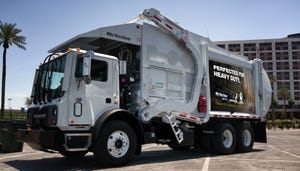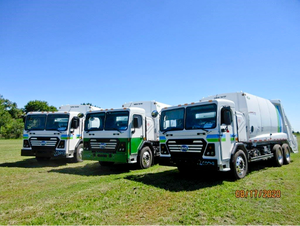international: Anaerobic Digestion Gains Ground In Europe
January 1, 1997
Ann Kulik
Organic waste recycling in Europe doesn't stop with mulching and composting. The march toward maximum recycling of the municipal waste stream is leading Europeans to anaerobic digestion as well.
Also known as fermentation, gasification and methanization, this process decomposes biodegradable material while converting it into biogas consisting of 55 to 60 percent meth-ane and 40 to 45 percent carbon dioxide. The residue, which averages 40 to 60 percent by weight of the feedstock, can be directly applied as a soil conditioner or composted for further refinement.
Anaerobic digestion and aerobic processing (composting) complement each other. The anaerobic method lends itself to wet, compact, untextured wastes from kitchens and restaurants that interfere with air
circulation and moisture control in traditional composting. Wastes from breweries, slaughterhouses, dairies, canning plants and other food industries also can be treated. Composting, on the other hand, is the method best suited for rough, structured wastes such as shrub cuttings and other yard debris.
Several different anaerobic digestion technologies, developed in various countries, are on the market. Facilities are operating, under construction or planned in a growing number of locations.
In Salzburg, Austria, 20,000 metric tons of source-separated biowaste is processed each year by means of the same Belgian technology that is earmarked for future facilities in Flan-ders and Germany.
A Swiss technology applied in facilities near Zurich ferments the feedstock in 15 to 20 days, followed by five to 10 days of postfermentation in an aerobic environment. Two reactors of this type are now under construction at the landfill in Braunschweig, Germany. Their total annual capacity will be 20,000 metric tons of separately collected biowastes. The biogas, together with landfill gas, will be sent to a combined heat and power station at the adjacent wastewater treatment plant. Startup is scheduled for Fall 1997.
In Elsinore, Denmark, a multistage facility was completed in 1991 to process 20,000 metric tons a year of biowaste. A one-stage biogas reactor using the same German technology came on line in Kelheim County, Germany, in 1995. It converts 13,000 metric tons a year of mechanically preprocessed bio- and slaughterhouse wastes into compost and gas to power the facility.
Further reactors of this type are under construction, if not recently completed, in Karlsruhe and Munich and are planned for other cities. Smaller plants, operating in Baden-Baden and Kaufbeuern, use existing wastewater treatment plant digestors.
Developers of a French technology report that their plant in Amiens, France, was the world's first to treat household waste by continuous anaerobic digestion. Commissioned in 1987, it originally handled the city's entire municipal waste stream but later was expanded to accept a nearby city's waste as well. A preparation unit separates out the biodegradable material for methanization, and the processed biogas is sold to Gaz de France. Since 1994, a similar plant has been operating in Tilburg, the Netherlands, on a feedstock of vegetable, fruit and garden (VFG) waste.
Using yet another technology, a facility in Waasa, Finland, has been digesting biowaste from 200,000 residents since 1990. The biogas is converted into electricity by a gas motor, and surplus energy is fed to the local grid.
A beneficial feature of anaerobic digestion is odor containment, since gasification takes place in airtight enclosures. Odor emissions occur only during pre- and post-treatment, and can be controlled by cleaning and deodorizing the exhaust air in a biofilter. Coupled with compact plant design, this allows facilities to be sited closer to population centers with less risk of offending residents.
Other considerations include the complicated nature of the biological process, which is more prone to downtime than composting, and the need to treat wastewater if its not recirculated. Typically, each metric ton of input generates about 500 liters of wastewater. The biogas use generates air emissions but also saves natural gas.
Europeans see anaerobic digestion as a way to boost their recycling rates to the 50 percent mark, especially considering that at least 50 percent of Europe's household waste stream consists of biodegradable materials. Two-thirds of that is VFG; the rest includes nonrecyclable paper and cardboard, soiled single-use paper products and growing quantities of biodegradable starch-based polymers.
According to Bert Lemmes, managing director of the Organic Reclama-tion & Composting Association in Brussels, "an overall view of the economics of ... biogasification still has to be achieved." Dr. Rainer Putz of the (German) Federal Association of Citizen Initiatives for the Environment reported, however, that the production of energy promises long-term advantages despite the higher capital costs of gasification.
Agreement NTS Technology Inc., Pittsburgh, has signed an installer agreement between the NTS-subsidiary Ground Water Control (GWC), Jacksonville,Fla. and GSE Lining Technology, Houston.
Approval
Eastern Environmental Services Inc.,
Trenton, N.J. has gained final approval
from the New Jersey Department of Environmental Protection Agency to complete its merger with Super Kwik, Voorhees, N.J.
based collection company with more than $22 million in annual revenue. Awards Al-jon Inc., Ottumwa, Iowa, has won a Governor's Export Award from the state of Iowa for their success in selling solid waste handling products and services in foreign markets.
Community Waste Disposal Inc., Dallas, has been awarded the Dallas & Denton County Corporate Re-cycling Council's 1996 Environmental Visions Awards for its innovative methods in municipal recycling.
Contracts
Dames & Moore, Los Angeles, has been awarded two contracts totaling $13 million by the U.S. Postal Service to provide environmental investigation, design and remdiation oversight services for post office facilities throughout the Midwest and western United States. Garb-Oil & Power Corp. and Gar-balizer Machinery Corp., sister companies based in Salt Lake City, have announced contracts with Imtech of Perth, Australia and Alberta Recov-ery Technologies, Lacombe, Canada for designing, manufacturing and installing mechanical processes for processing off-road tires in Australia and the Alberta Province.
Metcalf & Eddy Inc., Branchburg, N.J., has been awarded a multi-million dollar remediation contract at a Superfund site located in EPA Re-gion II.
Fiscal Synthetic Industries Inc., Chat-tanooga, Tenn., has reported strong financial results for the fourth quarter and fiscal year ended September 30, 1996. Net income for this quarter was $5.3 million or $0.90 per share, compared to a year-earlier net loss of $619,000 or $0.10 per share. New Distributor Galbreath Inc., Winamac, Ind., has named Gulfstream Waste Equipment, mpano Beach, Fla., as its newest distributor. New Facility Dinverno Recycling, Detroit, has completed a 25,000 square foot, $1.5 million construction recycling
center Penalty
Aptus Inc., Lake-ville, Minn., has paid a $1,600 fine for past hazardous waste violations to the Min-nesota Pollution Control Agency. People Frank W. Norris, Jr. has been named director of sales and marketing for Maintainer Corp. of Iowa Inc., Sheldon, Iowa.
Reimbursed
The state of Minnesota has reimbursed 19 businesses, counties and cities for their roles in cleaning up old, closed landfills across the state. The payment, totaling $7 million, is the third in a plan to reimburse eligible parties between $43 million and $46 million.
Relocation
LFG Specialties Inc., Middleburg Heights, Ohio, has relocated their Cleveland, Ohio engineering and administration offices. The new address: 705 South Friendship Dr., New Concord, Ohio 43762. (614) 826-7686. Fax: (614) 826-4948.
Shred-Tech Chicago, Mount Pros-pect, Ill., has moved their Wood Dale, Ill., office to a new location. The new address: 1907 Busse Rd., Mount Pros-pect, Ill. 60056. (800) 323-1265. Fax: (847) 589-8102.
Web Site
Jacobs Vehicle Equipment Co., Bloomfield, Conn., has established a home page on the Internet: http:// www.jakebrake.com.
You May Also Like


